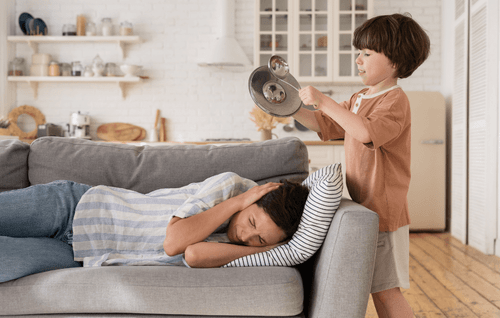How to Co-Regulate When You're the Dysregulated One
Because sometimes it's not just the kids falling apart...
Let’s be honest - co-regulation sounds beautiful in theory. You're calm, they're calm. You model breathing, they mirror it. You offer a soft, steady presence that helps their nervous system settle.
But what happens when you’re not calm? When you’re running on two hours sleep, your brain’s firing in twelve directions, you forgot about the appointment in a hour, and your child is mid-meltdown?
Welcome to the real world. Welcome to my world. Because I’m not just a mum - I’m a neurodivergent mum of three neurodivergent kids. And sometimes we all fall apart... together.
First things first: you’re not failing.
If you’ve ever thought:
“I can’t help them when I can’t even help myself.”
“I yelled… again.”
“I should’ve handled that better.”
Stop. Breathe. You’re human. You’re overwhelmed. And you’re not alone.
Co-regulation doesn’t mean being perfectly regulated all the time.
It means staying connected, even when things feel messy. It means doing your best with what you’ve got - even if that’s two spoons and a frayed nerve.
What is co-regulation, anyway?
In simple terms, co-regulation is the process of helping someone else calm their nervous system through connection. It’s eye contact. It’s a hand on the shoulder. It’s soft words or even silent presence. It’s the nonverbal vibe that says: “You’re safe. I’m here. We’ll get through this together.”
But here’s the twist: you can’t offer that if your own nervous system is in fight, flight, freeze, or fawn. And when you’re neurodivergent, stressed, burnt out, or dysregulated yourself… that happens a lot.
So… what do you do when you’re both melting down?
Here’s what I’ve learned (the hard way):
- Stop trying to fix everything immediately
When you're both activated, logic goes out the window. This is not the moment for consequences, lectures, or solutions.
Instead, focus on safety and connection - not control. Take a breath. Lower your voice. Sit down. Match your body language to calm, even if your insides are screaming.
- Tag out if you can
If there’s another trusted adult in the house, ask for help. If not? Use a safe space, a sensory tool, or even a cartoon as a pause button - not as a cop-out, but as a circuit breaker.
A few minutes apart can save everyone hours of emotional repair.
- Regulate yourself first - even if it feels selfish
Whether it’s a few deep breaths, cold water on your wrists, a quick stim or stretch, you deserve regulation, too.
Your nervous system is allowed to have needs. You’re not a robot. When you ground yourself, even just a little, your child feels that. And that’s where co-regulation starts again.
- Narrate your own regulation (this is powerful)
Say things like:
“Wow, I’m feeling really overwhelmed too. I’m going to take three deep breaths.”
“This is hard, but I’m going to try to stay calm with you.”
“Let’s both take a break and come back when we’re ready.”
You're not just modelling behaviour - you’re modelling self-awareness, which is way more important in the long run.
- Repair is everything
You’re going to get it wrong sometimes. You’re going to yell. You’re going to cry. And you know what? That’s okay.
Because what matters most is that you come back. You reconnect. You apologise if needed. You say:
“That was a hard moment for both of us. I love you. We’ll figure it out together.”
This teaches your child that mistakes aren’t the end of connection. That they’re lovable, even in their hardest moments - and so are you.
Final Thoughts (From a Mum in the Mess)
Co-regulation is not a Pinterest-perfect scene of yoga breaths and calm corners.
It’s messy. It’s loud. It’s real.
Some days, co-regulation looks like me crouched on the laundry floor, whispering “We’re safe” while my kid kicks and cries. Other days, it’s me shouting “EVERYONE TAKE A BREAK” and hiding in the pantry to breathe into my shirt.
And sometimes? It’s just survival and that counts too.
So if you’re the dysregulated one today… I see you.
Your love is showing up, even in the chaos.
You are not broken. You’re just a human being raising another one.
You’re doing better than you think.
With messy love and a few deep breaths,
Jody x
Neurodivergent mum of three, founder of Sensory Oasis for Kids
Recent Posts
-
What If Neurodivergent Brains Are the Future?
For years, the conversation around autism, ADHD, and other neurodivergent profiles has focused on de …Feb 23, 2026 -
When Back to School Doesn’t Happen
Every January, my feeds fill with first-day photos. Crisp uniforms. Fresh haircuts. Nervous smiles a …Feb 09, 2026 -
How to Write an Advocacy Email That Actually Gets Read
Because “per my last email” just isn’t cutting it anymore… If you've ever sat down to write an email …Jan 27, 2026




